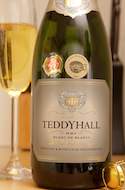Born in Pietersburg (now Polokwane) and schooled in Nelspruit in Mpumalanga, Teddy studied commerce at 'Tukkies' [the University of Pretoria] before settling in Gauteng. He describes himself wryly, with refreshingly frank self-mockery, as 'the ultimate Eighties yuppie: the broker in the big city with a BMW, entertainment budget and penthouse apartment, celebrating deals at all the best restaurants.'

With this came the good food and fine wine, accompanied by the most expensive Cuban cigars. 'I always bought a lot of wine and started developing a real love of it; in fact, it started consuming me. Until one day, I decided enough was enough and that I wanted to live in the Cape. I sold my share in my business and moved down here.'
It was the early 1990s. Teddy settled in Somerset West and got a job as a 'cellar rat', working for winemaker Hilko Hegewisch [a former Guild member] at Boschendal in Franschhoek in 1993. He also made his first wine - cabernet sauvignon - in the garage of his parent's house in Somerset West.
'My mom had always been a wine drinker, usually Bellingham Premier Grand Cru. It was actually at friends of hers that I tasted a red Burgundy for the first time and fell in love with wine. I was 17.'
He travelled to France for a stint as a seasonal worker in Pomerol, one of Bordeaux's greatest red wine appellations. 'l was a stagiaire [unpaid student worker] in the cellar at Château Gombaude-Guillot.' Back in the Cape, he worked for Kurt Amman at Rozendal in Stellenbosch. Finally, he decided to enrol at Stellenbosch University for a B.Sc. in viticulture and oenology. 'I was the old man among all these young guys. But studying what I loved was fantastic!'
Those young guys [like fellow Guild member Miles Mossop] recall Teddy's insatiable curiosity and searching questions. For Teddy, there's a fascination in detail and when his interest is piqued he's meticulous in achieving the right, but preferably the perfect outcome.
Teddy Hall regards 1999 as 'my first real vintage'. It was also the maiden vintage for a brand new cellar called Kanu, a redevelopment of the old Goedgeloof farm that was once home to historic Spier wines. It was during his five-vintage tenure at Kanu that Teddy became a champion (in both senses of the word) of Chenin blanc. 'Why Chenin? It's suited to the South African terroir, is incredibly versatile and rewards effort!'
'Passion is not enough to be a good winemaker; one needs the financial will to make great wine, good terroir and propensity not to stuff up!'
It started in 2001 when he won the Chenin Blanc Challenge and the Diners Club Winemaker of the Year award. He followed it up with wins in the Chenin Blanc Challenge in 2002 and 2004, travelling to the Loire as part of his prize. On top of winning, he'd invariably have more than one of his wines among the finalists, given that he'd become a past taskmaster at showcasing the classic Loire variety's versatility of style in the Cape, depending on where it's grown and how it's treated in the cellar.
Just for good measure, he continued his domination of the Cherrin Blanc Challenge in 2005, but this time with a Chenin blanc under his own label.
Teddy had been vinifying his own wines under the Rudera label since 2001, finding growers with special vines around Stellenbosch. And not only Chenin, but cabernet sauvignon and shiraz too. Though his red wine credentials may often have been sublimated by the publicity surrounding his chenins, his wide-ranging talent for different wine styles had been acknowledged among his peers and he was invited to join the Guild in 2003. Most of his bottlings for earlier auctions were, in fact, cabernets.
In 2004 he took the plunge and decided to fly solo; he did, after all, have a pilot's licence... But essentially it was for the same reason he'd initially left the rat race up north. 'I wanted a more balanced life; working for a successful winery, one can end up having as hectic a schedule as being in the brokerage business. Winemaking had always been a lifestyle choice.'
Along with this came the recognition of consumer demand, not only for serious, heavyweight wines but easy-drinking tipples. It was behind the launch of his eponymous label in 2006. 'Wine should be made for drinking, not for winning competitions. If they do that too, well, I'm not exactly going to complain.'
Teddy Hall Wines debuted with the simply named Chenin Blanc, easy on the palate and the pocket, under screwcap but still of sufficient quality to be chosen by American wine publication Wine Spectator as one of its 'value picks'. By the time Teddy sold his share in Rudera to his partner in 2008, he was ready for new beginnings.
 Mixed herb, pecorino cheese, and crouton salad with poached egg recipe by Teddy Hall....
Mixed herb, pecorino cheese, and crouton salad with poached egg recipe by Teddy Hall.... Tagliatelle with roasted tomato and anchovy recipe by Teddy Hall paired with Teddy Hall Hercules van Loon Cabernet Sauvignon Reserve wine....
Tagliatelle with roasted tomato and anchovy recipe by Teddy Hall paired with Teddy Hall Hercules van Loon Cabernet Sauvignon Reserve wine....